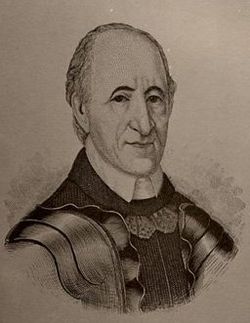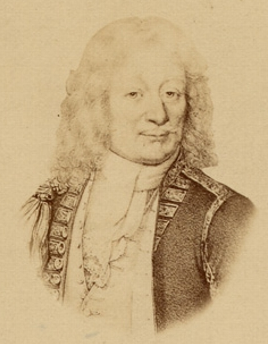<Back to Index>
- Captain of the French Army Joseph Coulon de Villiers, Sieur de Jumonville, 1718
- Governor of New France Michel - Ange Du Quesne de Menneville, Marquis Du Quesne, 1700
PAGE SPONSOR

Joseph Coulon de Villiers, Sieur de Jumonville (8 September 1718 – May 28, 1754) was a French Canadian military officer. His defeat and killing at the Battle of Jumonville Glen by forces led by George Washington was one of the sparks igniting the Seven Years' War.
Jumonville was born in the seigneury of Verchères, New France (now part of Quebec), the son of Nicolas - Antoine Coulon de Villiers, a French military officer. He began service with the French military at age 15, in his father's unit.
He served in the army during several conflicts with native groups in the western Great Lakes region where he was stationed with his father and several of his brothers. His father and one of his brothers were killed at Baie - des - Puants (present Green Bay, Wisconsin) in 1733 during a battle with the Fox tribe. In 1739, he served in Governor Bienville's abortive expedition against the Chickasaw nation. He was later promoted to Second Ensign and was stationed in Acadia during King George's War (as the North American theater of the War of the Austrian Succession is sometimes called). In 1745 he married Marie - Anne - Marguerite Soumande of Montreal.
In June 1754, Jumonville was posted to Fort Duquesne with his older half - brother, Louis Coulon de Villiers. The French were building up military strength in the Ohio Country in response to an increasing presence by British American traders and settlers.
On May 23, 1754, Jumonville took command of a 35 man detachment from the fort and headed southeast. The exact nature of Jumonville's mission has been the subject of considerable debate both at the time and up to the present day. Officially, his mission was to scout the area south of the fort. The French would later claim that he was a diplomat on a peaceful mission to deliver a message to the British. The British contended that he was sent to spy on their garrison at Fort Necessity and their road building project. Tanacharison, known as the Half King, the leader of a band of Mingos allied to the British, believed he was planning an ambush.
On May 27, 1754, a group of Native American scouts discovered Jumonville's party camped in a small valley (later called Jumonville Glen) near what is now Uniontown, Pennsylvania. Half King went to Washington and pleaded with him to attack the French encampment, claiming it was a hostile party sent to ambush them.
Washington took a detachment of about 40 men and marched all night in a driving rain arriving at the encampment at dawn. What happened next, like so much about the incident, is a matter of controversy. The British claimed the French discovered their approach and opened fire on them. The French claimed the British ambushed their encampment. In either event, the battle lasted little more than 15 minutes and was a complete British victory. Ten French soldiers were killed and 21 captured, including the wounded Jumonville.
Washington treated Jumonville as a prisoner of war and extended him the customary courtesies due a captured military officer. Washington attempted to interrogate Jumonville but the language barrier made communication difficult. During their conversation however, the Half King walked up to Jumonville and without warning struck him in the head with a tomahawk, killing him.
Why the Half King did this has never been clear. He had been kidnapped by the French and sold into slavery as a child. He claimed that the French had boiled and eaten his father. He was also a representative of the Iroquois Confederacy, which stood to lose its authority over other Indian peoples in the Ohio River Valley if the French were able to assert their control.
Other accounts state that de Jumonville was not in fact captured but was one of the first killed by Washington's expeditionary forces. Adam Stephen, a military officer who had accompanied Washington to the scene stated that Jumonville "was kill'd the first fire." No reference was made to Jumonville's having been captured and unsuccessfully interrogated by Colonel Washington. Also, it is unclear as to whether de Jumonville was dispatched by bullet or tomahawk. In his journal, George Washington stated that Half-King "was credited in certain quarters with having slain that officer [Jumonville] with his hatchet; but this was without any foundation in fact."
When word reached Fort Duquesne about the incident, Jumonville's half brother, Captain Coulon de Villiers, vowed revenge. He attacked Washington and the garrison at Fort Necessity and forced them to surrender on July 3, 1754. In the surrender document, written in French, Coulon de Villiers inserted a clause describing Jumonville's death as an "assassination".
Washington was heavily criticized in Britain for the incident. British statesman Horace Walpole referred to the controversy surrounding Jumonville's death as the "Jumonville Affair" and described it as "a volley fired by a young Virginian in the backwoods of America [that] set the world on fire."
It was an incident, ignited by Washington, that would become a global war. Significantly, it began while both powers were at peace. It also began under very dubious circumstances.

Michel-Ange Du Quesne de Menneville, Marquis Du Quesne (c. 1700 – 17 September 1778) was a French Governor General of New France. He was born in Toulon.
Du Quesne served from 1752 through 1755, and is best known for his role in the French and Indian War. Fort Duquesne, established in 1755 at the confluence of the Allegheny and Monongahela Rivers at what is now Pittsburgh, Pennsylvania, was named for him. It was abandoned by French forces in 1758 with the arrival of the much more powerful British Forbes Expedition, who erected Fort Pitt in its place.
He was very aggressive in enforcing French claims in North America, by some accounts even clearing out British settlers out of disputed areas. He built a line of defensive fortifications to strengthen the French presence. He later returned to France.
In 1758 he led a French squadron out of Toulon, intended to relieve another French squadron which had been sailing to Louisbourg to provide relief to the defenders there, but had been forced into Cartagena in neutral Spain. However, Du Quesne was attacked by a British force led by Henry Osborne and two of his ships were captured, including his own flagship. The ultimate result of this action was to deny Louisbourg any chance of relief, and it surrendered later in the year.
He died in 1778 in Antony, Hauts - de - Seine.
Duquesne University was named after him.